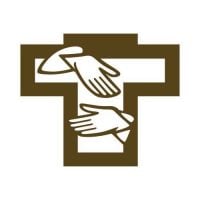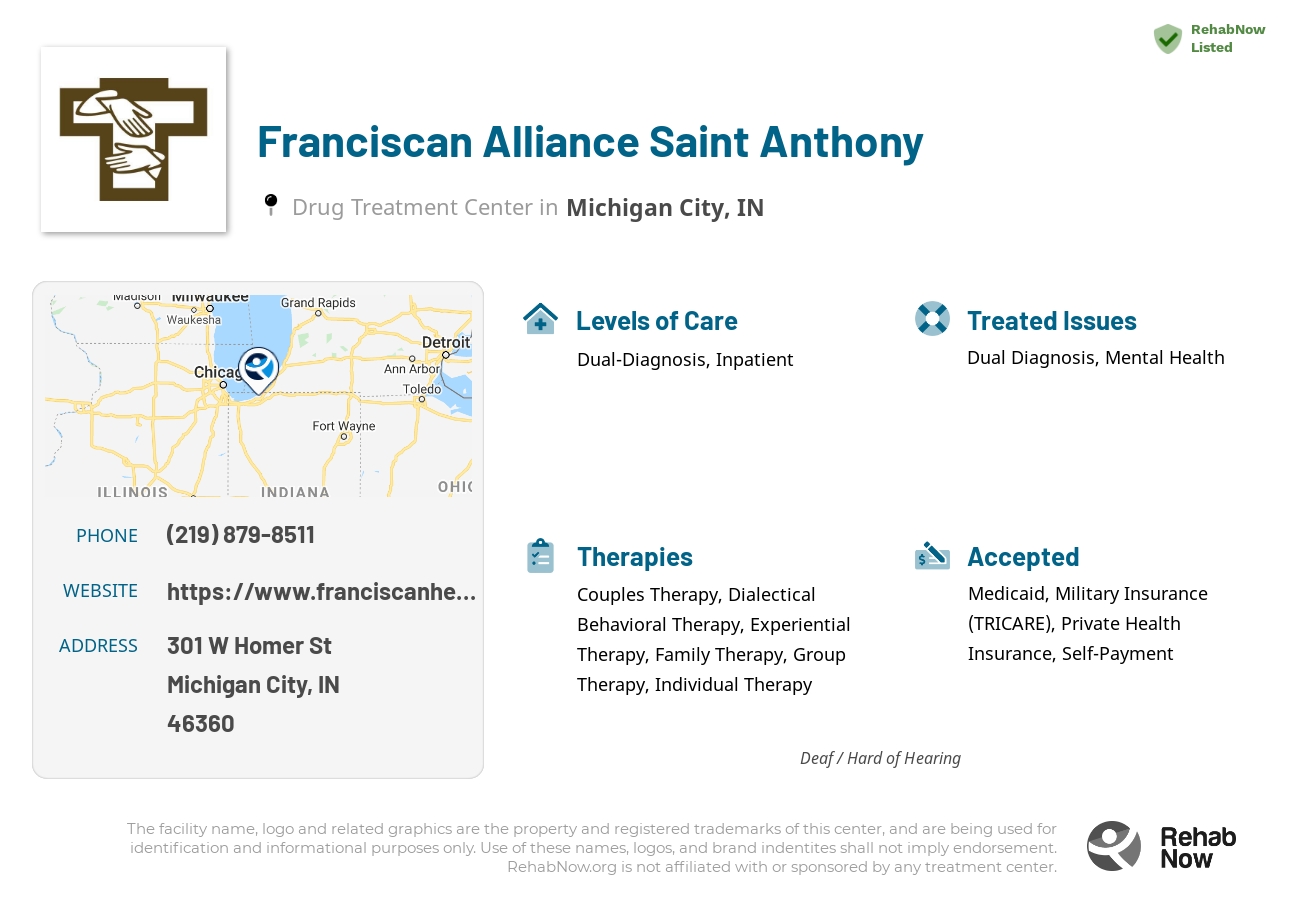Franciscan Alliance Saint Anthony
Drug Rehab Center in Michigan City, Indiana
Franciscan Alliance Saint Anthony is a medical facility in Indiana that offers a variety of addiction services, including short and long-term residential care, outpatient visits, and community resources, with a mission focused on providing compassionate, evidence-based care.
About Franciscan Alliance Saint Anthony in Indiana
Founded in 1902, Franciscan Alliance Saint Anthony is an Addiction Treatment Facility located in Michigan City, Indiana. Known for providing comprehensive care to individuals struggling with dual diagnosis and mental health issues, this facility goes beyond traditional addiction treatment. Their commitment to holistic healing is evident in their approach, ensuring that patients receive the emotional, physical, and spiritual support they need. Affiliated with the prominent healthcare provider Franciscan Alliance, this esteemed treatment center offers a range of services and levels of care specifically designed to address the unique needs of individuals facing addiction and co-occurring disorders.
At Franciscan Alliance Saint Anthony in Michigan City, they provide a diverse array of services and treatment methods for addiction and substance abuse. With a focus on dual diagnosis and mental health, their team of dedicated professionals offers comprehensive evaluation and assessments to develop individualized treatment plans. Through therapeutic intervention, counseling sessions, and premier inpatient levels of care, patients can expect evidence-based techniques such as cognitive-behavioral therapy (CBT) and group therapy models that foster healing from within. By forming a supportive partnership with each individual, Franciscan Alliance Saint Anthony guides them towards a path of recovery while providing tools for long-term sobriety.
Genders
Ages
Modality
Additional
Conditions and Issues Treated
Individuals who are addicted to drugs and/or alcohol often have one or more co-occurring mental health disorders. Addressing both the addiction and the mental health problems at facilities like Franciscan Alliance Saint Anthony can be very beneficial for these individuals.
Common mental health conditions that often co-occur with addiction include:
- Anxiety Disorders – People with drug and alcohol problems often suffer from anxiety disorders such as panic disorder, obsessive-compulsive disorder, social anxiety disorder, and generalized anxiety disorder.
- Depression – One of the most common mental illnesses co-occurring with addiction is major depressive disorder.
- Attention-deficit hyperactivity disorder (ADHD) – Many people with drug and alcohol problems also suffer from ADHD.
- Bipolar Disorder – People with bipolar disorder are more likely to suffer from drug and alcohol problems than the general population, and vice versa.
Levels of Care Offered
This center offers a variety of custom treatment tailored to individual recovery. Currently available are Dual-Diagnosis, Inpatient, with additional therapies available as listed below.
Inpatient recovery offers individual therapy, groups, and family therapy. The length of inpatient addiction treatment depends on the addict and their addiction. Inpatient rehab is a costly drug treatment, costing anywhere from $30k- to $60k. However, insurance often offers help in covering these costs.
Therapies & Programs
Individual therapy is ideal for addicts who want to focus on themselves. It can also be helpful for those whose withdrawal symptoms are exacerbated by the presence of other people.
Benefits of individual therapy are:
- Access to a personalized treatment plan that focuses on the individual needs of the addict
- More privacy during treatment sessions
- Better personal development through introspection
- Increased self-awareness regarding addictive tendencies in order to avoid relapse
- Greater potential for a long-term recovery plan
- Receiving professional advice and detox assistance from medical staff
Couples therapy is a treatment method used to help couples in which at least one member of the couple has a drug addiction. Couples therapy can be used whether the addicted partner is using drugs or in recovery. An additional benefit of couples therapy is that it can help make other types of treatment, such as 12-step programs, more effective.
Family therapy can help you and your family deal with old issues that may trigger substance abuse. The idea behind family therapy for drug addiction is that you are never fully healed from substance abuse until you’ve healed your relationship with your family, too. To get sober, you need to find a different way to cope with the pain in your life.
This is when a group of people in various stages of recovery meet up and discuss their experiences, triggers, successes, failures, and even alternative therapies! Unlike support groups where everyone already knows each other, group therapy is conducted along side outpatient or inpatient treatment at Franciscan Alliance Saint Anthony.
Dialectical Behavior Therapy (DBT) is used by drug treatment centers across the United States to help drug addicts become sober. DBT is a type of Cognitive Behavioral Therapy (CBT) that combines traditional behavioral treatments with elements from DBT, including dialectics, distress tolerance, and interlocking issues. Some of the negative behaviors associated with addiction, such as impulsivity and mood swings, are addressed in DBT, while others like craving and isolation are not. It is commonly used to treat Borderline Personality Disorder (BPD) along with substance abuse disorders.
The four DBT modules are mindfulness, interpersonal effectiveness, emotion regulation, and distress tolerance:
- Mindfulness helps recovering addicts learn to identify and experience their emotions while realizing that they are not permanent.
- Interpersonal Effectiveness includes assertiveness, asking for what you need, and saying no while improving communication skills.
- Distress Tolerance has recovering addicts learn how to tolerate distress at the moment and avoid resorting to substance abuse.
- Emotion Regulation is used to identify, express and change emotions.
CBT is a psychotherapy approach and method. [ws-nap-name] people to examine how their thoughts, including habitual harmful and inaccurate thinking, affect their actions. CBT is based on the idea that rigid, inflexible thinking leads to poor stress management, which leads to emotional distress.
Similarly, CBT helps people identify and change negative behaviors. It makes you question your perceptions and ask if they are realistic. CBT asks people to examine their behaviors and emotional responses and how they affect their lives. CBT aims to change people’s thinking and behavior to lead a more balanced and healthy life.
Moreover, CBT has been shown to reduce anxiety disorders, depression, and symptoms associated with harmful thoughts or actions.
Nutrition therapy has been used to help drug addicts for decades. Many early reports on addiction treatment indicate that some patients recovered from the “satisfying power of food”. For years, this phenomenon has been utilized as a treatment modality in eating disorders for adults, adolescents, and children. Specific nutrients have been identified that influence neurotransmitters associated with reward pathways of the brain.
Studies have shown that carbohydrate loading with complex carbohydrates to elevate serotonin levels was effective in treating bulimia nervosa. This approach prompted researchers to explore the use of this type of nutritional intervention in other disorders.
Nicotine replacement therapy is a drug treatment that allows people to get the effects of nicotine without chewing or smoking. The therapy is often done with a patch, and doses of nicotine are reduced until nicotine is no longer needed. NRT helps smokers get nicotine into their system without resorting to smoking, and it has been shown to be an effective way to help people quit smoking. Coupling NRT with counseling and other means of support gives long-term smokers a better chance of removing their unhealthy habit.
Patient Experience
Experiential Therapy at Franciscan Alliance Saint Anthony
Experiential Therapy is a type of therapy that involves activity to recreate situations that may have caused trauma or negative emotions. Experiential therapy at Franciscan Alliance Saint Anthony in Michigan City, IN can involve acting, props, arts and crafts, animal care or other tools that may be effective. This therapy is done on an individual basis and can help revisit and heal from past traumas. Trust between the therapist and individual is important for success. Experiential therapy can help you more closely become you and move through life positively and authentically.
Payment Options Accepted
For specific insurance or payment methods please contact us.
Is your insurance accepted?
Ask an expert, call (888) 674-0062
Franciscan Alliance Associated Centers
Discover treatment facilities under the same provider.
Learn More About Franciscan Alliance Centers
Additional Details
Specifics, location, and helpful extra information.
Michigan City, Indiana 46360 Phone Number(219) 879-8511 Meta DetailsUpdated November 25, 2023
Staff Verified
Franciscan Alliance Saint Anthony Patient Reviews
There are no reviews yet. Be the first one to write one.
Michigan City, Indiana Addiction Information
The state of Indiana ranks 14th in the nation for drug abuse, but 17th for drug overdoses. The state has many high-quality rehabilitation centers, but reports show that there are about 20 deaths per 100,000 people. This is due to its location making it a drug trafficking haven, where many drugs are further distributed into the country.
Treatment in Nearby Cities
- Rushville, IN (163.9 mi.)
- Brownsburg, IN (131.5 mi.)
- Anderson, IN (127.8 mi.)
- Muncie, IN (131.2 mi.)
- Mishawaka, IN (38.5 mi.)
Centers near Franciscan Alliance Saint Anthony
The facility name, logo and brand are the property and registered trademarks of Franciscan Alliance Saint Anthony, and are being used for identification and informational purposes only. Use of these names, logos and brands shall not imply endorsement. RehabNow.org is not affiliated with or sponsored by Franciscan Alliance Saint Anthony.









